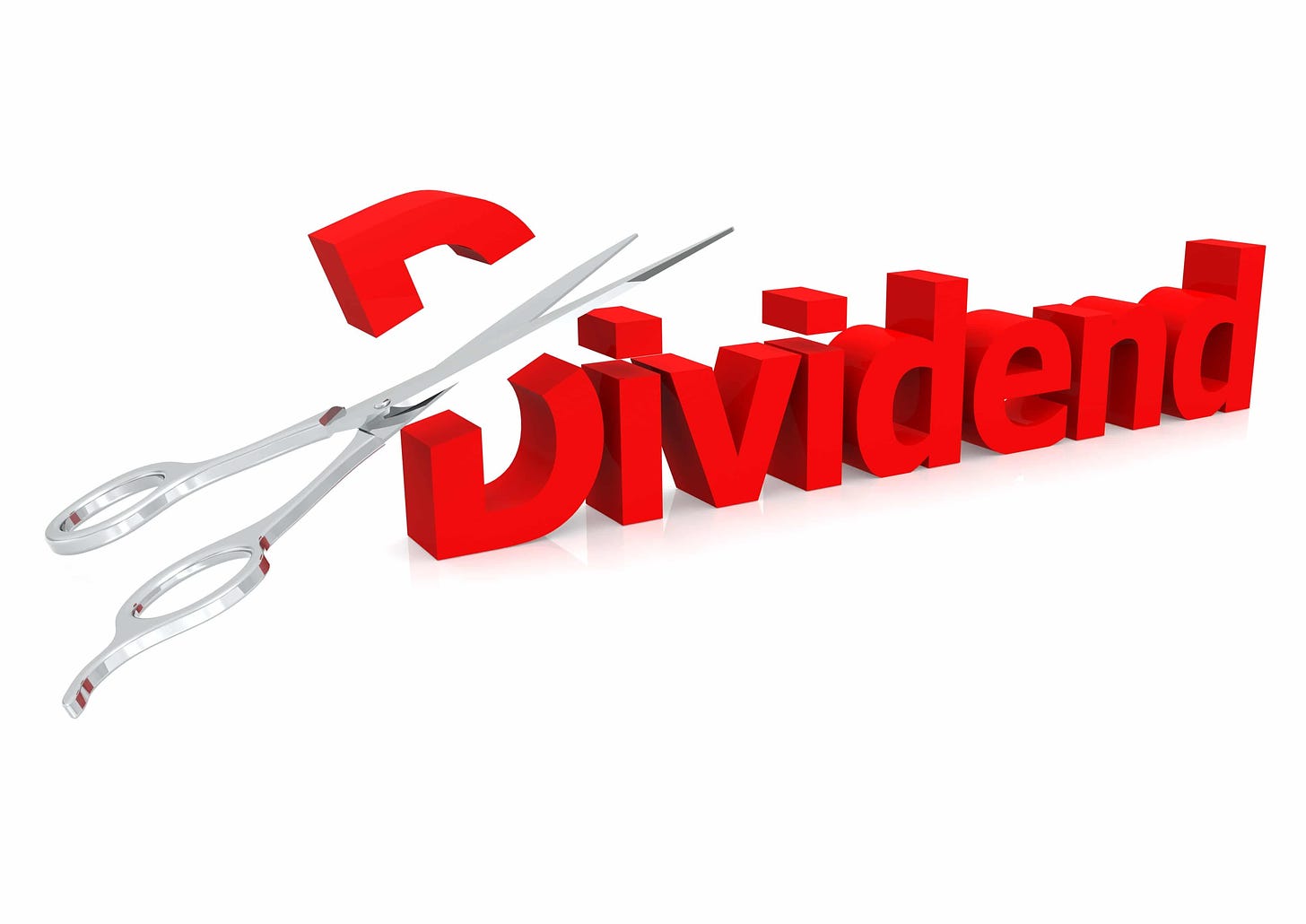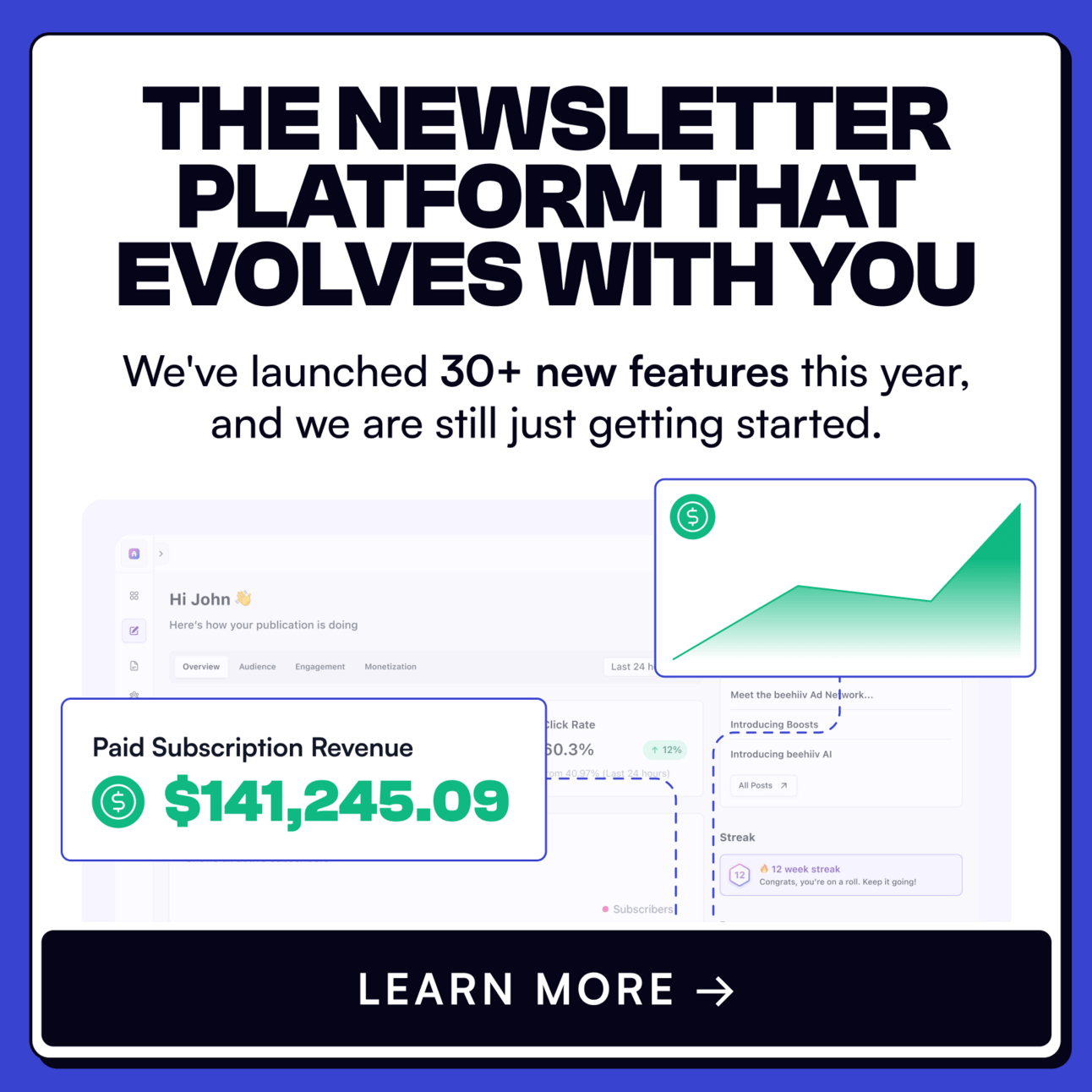
This isn’t traditional business news
Welcome to Morning Brew—the free newsletter designed to keep you in the know on the business news impacting your career, company, and life—in a way you didn’t know you needed.
Note: this isn’t traditional business news. Morning Brew’s approach cuts through the noise and bore of classic business media, opting for short writeups, witty jokes, and above all—presenting the facts.
Save time, actually enjoy business news, and join over 4 million professionals reading daily.

Welcome to The Profit Zone 👋
Where thousands of millionaires, CEO’s and high-performing entrepreneurs read the #1 financial newsletter on the web.


👉 24X: A new exchange offering 23-hour trading 💸
👉 Dividend Cuts: A Dividend Investor’s Worst Nightmare ❌
👉 Why Do Dividend Cuts Happen: Tips For Avoiding Them 💰
👉 Dividend Aristocrats & Kings: The Holy Grail of Dividend Investing 📈
👉 Beehiiv: Project Blackout Ends Today - Secure Your Limited Time Offer 🐝


"With a good perspective on history, we can have a better understanding of the past and present, and thus a clear vision of the future."


New stock exchange aiming to offer 23-hour trading set to launch in 2025

There’s a new stock exchange in town.
The 24X National Exchange is set to debut in the 2nd half of 2025, which will offer trading from 4 AM to 7 PM EST on weekdays.
That could be expanded to 8:00 PM EST on Sunday through 7:00 PM EST on Friday, with a one-hour pause each day, once the exchange clears some final hurdles with the SEC.
The platform also intends to extend its operations to overnight trading, from 8:00 PM to 4:00 AM.
This movement is part of a push towards a wider window of stock trading, which platforms like Robinhood and Interactive Brokers are already offering on certain securities to their clients.
24 Exchange CEO and Founder Dmitri Galinov said “Traders are most at risk when the market is closed in their geographic location. 24X National Exchange will seek to alleviate this problem by facilitating around-the-clock U.S. equities trading for broker-dealers and their institutional and retail customers.”
DD’s Take: EXTEND MARKET TRADING HOURS!


Dividend Cuts: A Dividend Investor’s Worst Nightmare

Picture this…
The year is 2050 and you have $3 million invested in dividend stocks.
You’ve spent the last 30 years of your life consistently buying dividend stocks and reinvesting all of your dividend income.
You’ve made tons of financial sacrifices to get to this point.
Your goal was to retire from working for a salary and live off your dividend income, travel with your family and enjoy everything life has to offer without spending 40 hours a week inside a cubicle.
You’re excited to start this chapter of your life, but then…
Dividend cuts decide to ruin your plans.
Your $3 million portfolio that had an average dividend yield of 4%, paying you $120,000/year in passive income, is now paying you only $60,000/year.
“How am I going to live off that?” You think to yourself…
Retirement seems so much further away and you can’t sleep at night.
You debate continuing to work for another few years to make up for the lack of income.
Scary right?
I often think about a scenario like this happening to me.
As I’ve said in the past, retirement isn’t an age, but a number.
The average age of retirement in the U.S. is 64 years old.
The average life expectancy is 77 years old.
You’re telling me that I need to work until I’m 64 years old to enjoy the next 13 years of my life?… No thanks.
This is why we buy assets that generate cash flow.
So that every $1 we have invested is $1 closer to our passive income goals.
But the reality is, dividend cuts are out of our hands.
It’s a management decision and unless you’re part of the management team, your income is at the mercy of the company and its performance.
With that being said, there are a few steps you can take to help minimize the chances of a dividend cut, and if it does occur, to minimize the impact it has on your passive income.
Let’s dive into it…
Why do dividend cuts happen
Dividends are cash (sometimes stock) payments to shareholders that are paid out from their excess earnings.
Many younger companies don’t pay a dividend because it’s more beneficial to shareholders that the company retains its earnings and invests them back into the business in hopes of future growth.
But mature companies, those that have been profiting off their customers for years, have expanded geographically and have loyal buyers who keep coming back for more, may not need all of the profits they earn.
That’s when companies decide to start paying a dividend.
Companies will decide to cut their dividend because they no longer have the cash on hand to continue to support their daily operations while also paying shareholders.
There are a variety of reasons why dividend cuts might happen, here are a few notable ones:
An existing product line sees a decrease in demand
An increase in the price of materials
An increase in the price of logistics
An acquisition or merger that costs the company too much money
As dividend investors, the best thing we can do is lower our chances of experiencing a dividend cut.
Here’s how you can start doing it yourself:
Profits, not debt.
A big warning sign with any dividend paying company is when they’re paying out dividends from debt.
Borrowing money to pay out shareholders is a red flag.
The reason is simple: if the company were to see a decline in revenues and are unable to keep up with their debt obligations (payments of interest), creditors will start demanding their money.
Once that happens, and if the dividend is being paid out via debt, you can be sure that your dividend will likely get cut, or even worse, eliminated.
The Dividend Payout Ratio
The dividend payout ratio provides investors with an inside look at how much the company is paying out in dividends relative to their earnings.
When it comes to payout ratio’s, I like to buy companies in the 35-55% range.
This is personal preference however I’ve found that this range provides dividend investors with a good chunk of cash flow while the company also maintains some wiggle room for internal investment and the possibility of increasing dividends in the future should they choose to do so.
You NEVER want to buy companies with a 100%+ payout ratio.
Red flag ❌
This signals that every dollar the company generates in earnings or free cash flow is paid out to shareholders, leaving absolutely no margin of safety for the business itself.
Buy Stocks That Have Been There Before
“Past performance doesn’t guarantee future results”
While this may be true, dividend stocks provide somewhat of an exception to this rule.
Why?
There is a list of dividend paying companies called The Dividend Aristocrats that is an elite group of companies who have increased their dividends for 25+ consecutive years.
Additionally, there’s an even more exclusive list of dividend paying companies called The Dividend Kings who have increased their dividends for 50+ consecutive years.
These are stocks that were able to continue raising dividends through wars, pandemics, recessions and political turmoil, which provides dividend investors with a level of confidence in their future cash flow.
Invest in dividend-paying companies that came out on the other side unaffected by anything going on around them.
Determine the Financial Strength of the Company
You can probably look at someone’s bank statements and determine if they can cover their bills for the next year in the event they get laid off from work and have no income.
The same goes for a business.
As the great Warren Buffett once said “never invest in a business you cannot understand”
As a dividend investor, it’s important to analyze a business’s expenses, debt obligations and revenue to determine the probability of that company surviving should things go south.
It’s also important to determine if a company has the ability to redirect some of its resources to continue paying a dividend.
There have been businesses in the past that have pushed back scheduled investments to free up extra cash to pay shareholders.
Ensure that the businesses you’re analyzing can do the same if push comes to shove.




Did you enjoy this newsletter?


PROJECT BLACKOUT - BEEHIIV 🐝
Are you ready to elevate your newsletter?
Or maybe you haven’t started one and want to build an email list that turns into a cash-flowing asset.
Newsletters are vital for online businesses going into 2025.
And if you don’t have one, you’re going to get left behind.
Beehiiv offers a suite of tools to help you create, grow, and monetize your content seamlessly.
Why beehiiv?
Intuitive Design Tools: Create stunning newsletters without any coding skills.
Integrated Website Builder: Launch a professional website alongside your newsletter.
Growth Mechanisms: Utilize referral programs and recommendation networks to expand your reach.
Monetization Avenues: Access an ad network and offer paid subscriptions to generate income.
Comprehensive Analytics: Gain valuable insights into your audience with advanced analytics.

Special Black Friday Offer:
Enjoy 20% off all annual Beehiiv plans.
This offer ends TODAY December 2nd.
Don't miss this chance to invest in a platform that supports your growth.
Bonus 🚨
If you sign up using the link button above and create a Beehiiv account, send me a DM on X or email ([email protected]) with the email you used to sign up and I will give you the following 100% FREE:
🔎 Help with creating a launch strategy
📈 Tips and tricks for growing your subscriber list
💰️ Ways to monetize your newsletter so you can start turning it into a cash-generating asset
All of the above comes at no additional cost to you when you use the link here to create a Beehiiv account.
I look forward to helping you start and build your newsletter.

Disclaimer: The publisher does not guarantee the accuracy or completeness of the information provided in this page. All statements and expressions herein are the sole opinion of the author or paid advertiser.
Dividend Domination Inc. is a publisher of financial information, not an investment advisor. We do not provide personalized or individualized investment advice or information that is tailored to the needs of any particular recipient.
THE INFORMATION CONTAINED ON THIS WEBSITE IS NOT AND SHOULD NOT BE CONSTRUED AS INVESTMENT ADVICE, AND DOES NOT PURPORT TO BE AND DOES NOT EXPRESS ANY OPINION AS TO THE PRICE AT WHICH THE SECURITIES OF ANY COMPANY MAY TRADE AT ANY TIME. THE INFORMATION AND OPINIONS PROVIDED HEREIN SHOULD NOT BE TAKEN AS SPECIFIC ADVICE ON THE MERITS OF ANY INVESTMENT DECISION. INVESTORS SHOULD MAKE THEIR OWN INVESTIGATION AND DECISIONS REGARDING THE PROSPECTS OF ANY COMPANY DISCUSSED HEREIN BASED ON SUCH INVESTORS’ OWN REVIEW OF PUBLICLY AVAILABLE INFORMATION AND SHOULD NOT RELY ON THE INFORMATION CONTAINED HEREIN.
Any projections, market outlooks or estimates herein are forward-looking statements and are inherently unreliable. They are based upon certain assumptions and should not be construed to be indicative of the actual events that will occur. Other events that were not taken into account may occur and may significantly affect the returns or performance of the securities discussed herein. The information provided herein is based on matters as they exist as of the date of preparation and not as of any future date, and the publisher undertakes no obligation to correct, update or revise the information in this document or to otherwise provide any additional material.
The publisher, its affiliates, and clients of the publisher or its affiliates may currently have long or short positions in the securities of the companies mentioned herein or may have such a position in the future (and therefore may profit from fluctuations in the trading price of the securities). To the extent such persons do have such positions, there is no guarantee that such persons will maintain such positions.
Neither the publisher nor any of its affiliates accept any liability whatsoever for any direct or consequential loss howsoever arising, directly or indirectly, from any use of the information contained herein.
By using the Site or any affiliated social media account, you are indicating your consent and agreement to this disclaimer and our terms of use. Unauthorized reproduction of this newsletter or its contents by photocopy, facsimile or any other means is illegal and punishable by law.






